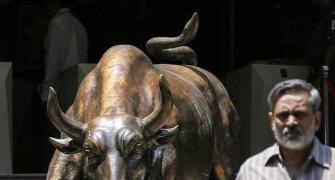'It's hard to call whether the Indian markets will go through a time or price correction.'
'There could be a swift 5 to 10 per cent fall in the market in the next two months or there could be a gradual fall and six months sideway movement.'
'Eventually, I think there will be a bit of both.'

Jimeet Modi, founder and CEO, SAMCO Ventures, believes India is on a solid footing today, but given the valuation of the Indian stock markets investors going in at these levels won't make much money.
"We don't believe there is any significant margin of safety in the markets today," Modi tells Rediff.com's Prasanna D Zore.
How do you look forward to the earnings season? Will there be an earnings upgrade or downgrade?
There are certain pockets that are expected to do well. Banks and metals are expected to do okay.
There are certain segments of the markets where earnings will be a washout.
IT, pharmaceuticals will be under pressure; FMCG will be under tremendous pressure because of the implementation of GST.
Net-net Q2 will be not a good pocket to look forward to.
How managements are seeing the effects of GST playing out will be important to see.
Managements are hopeful that the unorganised sector moving to the formal economy will pan out without too much pain.
In the long term, the advantages and positives of GST will play out well.
In a nutshell, there is nothing much to look forward to from Q2 earnings except for some pockets.
Why do you feel that earnings from the IT, pharma and FMCG sectors would be a washout?
Every set has its own set of problems. With pharma, the pricing pressure in the US is quite high.
Price erosion is continuing in double digits in the United States. That's going to put a lot of pressure on the sector.
There isn't much clarity on issuance of visas (H1-B) from the US and also the Indian rupee has been strengthening against the US dollar until last week of September.
The IT sector is largely export-dominated and could bear the brunt of these two factors.
The FMCG sector is beset with the issue of de-stocking of goods before the GST implementation around June.
Ground report suggests that the entire supply and distribution chain, right up to the retail level, has yet to come to terms with the GST regime. Because of which uptake of stock and inventory is lower and that is having a repel effect right till the manufacturer and marketer level.
But these being cyclical in nature, these issues will be straightened out in the next two to three quarters.
Are the markets fairly valued currently or do you think they are overheated?
Again, certain pockets in the market are extremely overheated.
In general, we don't believe there is any significant margin of safety in the markets.
There is very little money to be made for investors going in at these levels.
Either earnings have to catch up with expectations over a period of time or we will go through a time or price correction for the margin of safety to increase and give investors an opportunity to make money.
Certain pockets are extremely expensive.
If you look at the IPO market, it is quite heated up right now but it will be too early to call it a bubble.
Also, pockets like the banks and NBFCs too are extremely overheated.
They are trading at 30 per cent to 40 per cent premium valuations compared to their 10-year averages.
For example, for the NBFCs, their average price to book value is three times; today it has gone up to 4.2 times.
Also, the average price to earnings ratio of NBFCs is 17 times; today they have gone to 24 times.
These over-stretched valuations don't give too much comfort if I were an investor.
What are the chances that the market will see a price correction and not time correction?
It's hard to call whether the Indian markets will go through a time or price correction. It could be either.
There could be a swift 5 to 10 per cent fall in the market in the next two months or there could be a gradual fall and six -months sideway movement.
Eventually, I think there will be a bit of both.
Now, we have had a nine month rally, but the severity of either the time or price correction is difficult to guess.
Given the economic downturn in India, the geo-political tension in the Korean peninsula and the fear of the US Federal Reserve tightening rates too much too fast, do you see a market sell-off in the distant future?
In an overheated market like India's, any amount of tensions quickly gets sold into very aggressively.
It can, sort of, change the trend and the direction of the market very, very quickly.
The idea is, suppose at the end of the day there is a war (between North and South Korea), because again this is just guess work, and if the markets tend to overreact on the downside and we see a 15 per cent correction, or there is any sort of overreaction because of geopolitical tensions, it could turn out to be a very good buying opportunity.
If the tensions between the two Koreas and by proxy between the US and China do play out, and if there is a significant correction, then it will be a great buying opportunity from an investor point of view.
These tensions will be of no consequence whatsoever from the earnings and economic point of view.
Wars have always presented investors with a great opportunity to buy.
If that happens, investors should pounce upon the opportunity with both hands and buy.
We believe that predicting such outcomes helps nobody.
We should be reactive and not predictive.
We should prepare ourselves with what to do if an event does actually play out. That we should not bother over whether it will happen or not.
For example, we reacted very, very aggressively to demonetisation. It gave investors a fantastic opportunity to build a long-term portfolio.
That is how you must react to an event.
Do you subscribe to Morgan Stanley's Ridham Desai school of thought that the Sensex will hit the 100,000 mark in 10 years?
Mr Desai is a great thinker and very intelligent market analyst. Without commenting on any specific number I think we concur with him in the sense that India is in the grip of a secular bull market.
We are in a secular uptrend and we will be seeing meaningful corrections going ahead.
Having said that, the India story is on a solid footing.
Whether the Sensex is at 80,000, 100,000 or 120,000 is a function of too many other things.
The direction of the Indian market is very clear: it is heading only upwards.
What kind of earnings growth do you see foresee in the next 10 years?
It is fair to assume that if interest rates remain where they are then we could grow at 15 per cent CAGR in the next 10 years.
Are you worried about Indian GDP growth given that it has been on a downward slope in the last six consecutive quarters?
Or, do you see this as an opportunity, in the sense that it will only be on an upward trajectory from here on?
Our research over the past several years suggests that GDP numbers has got nothing to do with stock market movement.
Inspite of a falling GDP for the last six quarters we have seen a rising stock market.
What is important to observe is the effect of economic growth on corporate earnings. There is a slowdown in certain pockets; improvement in some other pockets.
What are the three pain points for the markets in the times ahead?
The top one, no doubt, has to be interest rates.
If the US Fed charts out an aggressive interest rate hike, and, let us assume the (Indian) government actually overshoots its fiscal deficit target, and therefore comes up with a large borrowing programme in H2FY18 (the second half of financial year 2017-2018, that is, from October 2017 to March 2018), then we are in trouble.
Then you will see the inflation spiking, interest rates rising.
The second pain point from an Indian perspective is the movement of the Indian rupee against the dollar.
From an economic standpoint it is important that the rupee depreciates (against the dollar).
If the rupee does depreciate to 67-68 levels then there will be a softening in the markets from the current levels, but it will be good for the exports as well as the Indian economy because the cheap import substitution that is happening at the moment will get corrected from a structural point of view.
The third factor is the political scenario, in the sense that, if the government starts being too populist with the fisc with a view to 2019 (the Lok Sabha election), now that they are not too far.
What do you mean by extremely populist measures?
I mean populist dole outs where the fiscal deficit from 3.2 per cent sort of balloons to 3.7 to 3.8 per cent (of GDP). )It could mean any spending that doles out money without creating any productive assets for the economy.
Where do you think can investors still make decent money in this market with a five-year investment target?
The largest story likely to play out in the next four-five years is the agri and agri-inputs sector.
The Modi government is very serious about doubling farm income and therefore the rural and agri and agri-inputs story is going to be one of the most important going ahead.
If investors can identify stocks in this space that are still attractively valued, then they will make reasonable amount of money in these spaces.
What sectors should investors avoid now?
Very clearly, the financials and the NBFCs because of the extreme overheating that has happened in this space.
The second sector to avoid could be metals.
They have seen a fantastic performance since the beginning of this year and off their lows and now there is very little margin of safety or comfort at current valuations.
There are already signs of China turning around in terms of their policy on metals. This will lead to a huge glut of metals in the market and we could see correction in metal prices and metal stocks as well.
Photograph: Reuters









